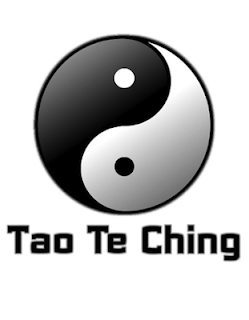—Tao Te Ching, traditionally attributed to Lao Tzu, 6th-4th century B.C.
I'm kidding, slightly. The real, full definition is Tao Te Ching, chapter 1:
The tao that can be told
is not the eternal Tao
The name that can be named
is not the eternal Name.
The unnamable is the eternally real.
Naming is the origin
of all particular things.
Free from desire, you realize the mystery.
Caught in desire, you see only the manifestations.
Yet mystery and manifestations
arise from the same source.
This source is called darkness.
Darkness within darkness.
The gateway to all understanding.
Translated by Stephen Mitchell (1988)
Luckily we have expunged all previous ideas of God because we now take inscrutability to a new level. In fact one could argue that there is no God in Taoism; others insist there is; and still others say the question is pointless or only answerable by practicing Taoism. Yes, tao means 'way' but that is a translation. It may be thought of as a mass noun 'the way' as in a collection of ways. Secondly, western thought focuses on metaphysical or epistemological terms such as 'being' or 'truth' or 'meaning' while Taoism centers on the scarcely salient 'way', referencing ethics, politics, education, and psychology. Thirdly, tao or 'way' may be used as a verb. So the famous first line of the Tao Te Ching above can be, and has been, translated, "tao that can be tao'd is not constant tao".
This is just one of hundreds of translations of the Tao Te Ching—all different, often significantly. The ancient Chinese language in which the text was written does not lend itself to abstraction or logical structure. Each word is less a concrete idea than suggestive associations. This makes perfect sense in defining God, but "perfectly impossible" for a satisfactory translation, according to fantasy writer Ursula K. Le Guin, who has studied the Tao Te Ching for forty years and published her own translation. Notice the last word has been translated as both understanding and mystery—completely contradictory ideas in English. This could be the top definition if you learned ancient Chinese.
That you haven't is part of the reason it's here: we are reminded that God is a translation. That from ancient Chinese to English is impossible enough. That from God to language and the modality of thought is beyond impossible.
Of course any self respecting Taoist would laugh at this list since we are wanting a definition of God, and according to Le Guin's translation, "the ever-wanting soul sees only what it wants." Finally, in accord with the laughing Taoist, I'd like to share another passage from Tao Te Ching:
When the lofty hear of Way they devote themselves.
When the common hear of Way they wonder if it's real or not.
When the lowly hear of Way they laugh out loud.
Without that laughter, it wouldn't be Way
[Note concerning tao as a verb: More and more as we proceed through this list, we will find that God seems less a noun than a verb. However, even in this age of google and friend, though many write about God as a verb, they don't mean it nor practice it. Whether through lack of commitment, intelligence, or proof-reading, how curious is it to read article after article arguing that God is a verb and seeing it used only as a noun! Here might be the first time: "There is no reason to believe the universe was created, and neither was it Godded. On the contrary, it Gods." or "God that thought." or "The sign read 'No frisbee playing or disrobing on the beach'. Thank goodness it said nothing about Godding." or, finally, "After throwing the winning touchdown pass, any thought of supernatural assistance or personal blessing was Godded from him immediately."]

No comments:
Post a Comment